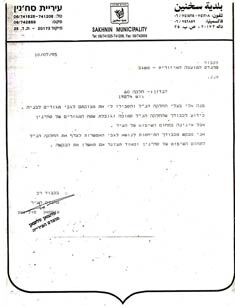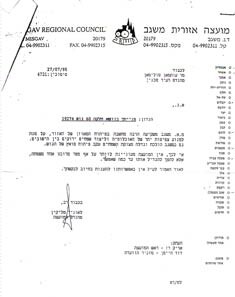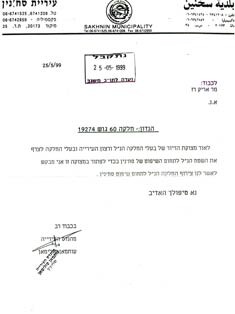The Electronic Intifada 17 May 2005
In early March, the Electronic Intifada published a story about Ali Zbeidat and his family, Palestinian citizens of Israel whose home in the Galilee is threatened with demolition by a Jewish regional council called Misgav.
For a decade Misgav has been seeking to prevent Ali, his Dutch wife Terese and their two teenage daughters, Dina and Awda, from living on land that has belonged to his family for decades. Using discriminatory land laws, the regional counicl has claimed jurisdiction over their land, even though it is located inside the Arab town of Sakhnin.
The story, which received wide publicity, so deeply embarrassed the mayor of Misgav, Erez Kreizler, that he issued a statement denying the story’s truth and accusing the family and Sakhnin municipality of running a campaign of misinformation to denigrate Misgav and the state of Israel.
Below, EI publishes for the first time some of the long-running correspondence between Misgav and Sakhnin to show that it is Kreizler and his regional council who have been waging a campaign of misinformation to conceal from public view the apartheid land policies they enforce inside Israel.
We also publish Kreizler’s most recent statement, sent to a leading Israeli government official in the United States, as well as Ali Zbeidat’s own personal response to Kreizler’s claims.
For those unfamiliar with the background to the story, let us recap on Ali’s saga with Misgav. The regional council, which represents dozens of small exclusively Jewish communities, has been given control of much of Sakhnin’s lands, including the plot on which Ali’s house stands, land that the state acknowledges has been owned by Ali’s family for generations.
Because jurisdiction over the land has been transferred to Misgav, the fate of Ali’s home is not in his hands nor those of his elected representatives on the Sakhnin municipal council. Misgav has determined that the land on which Ali’s house stands should be for agricultural use only, even though it is surrounded closely on three sides by other Sakhnin homes.
Misgav is not a disinterested party: it was established in the early 1980s as part of a government-sponsored drive to “Judaise” the Galilee - or to take land from Arab communities and pass it to Jewish communities. As a result most Arab towns and villages in the Galilee have found themselves with no land left on which to build. Ali’s case is just one of many.
The publication of Ali’s story prompted a letter-writing campaign by concerned Americans and Israelis to Kreizler. The issue might have ended there but for the fact that a few correspondents copied their letters to Shlomo Meir, the Israeli Consul General for the New England area, based in Boston.
Kreizler, embarrassed that the Judaisation methods being practised by Misgav council against Arab citizens were being publicised, began a damage limitation exercise. He wrote to Meir a lengthy email, dismissing the claims made in the story.
Misgav’s mayor suggests that Sakhnin municipality and the Zbeidat family are really the ones at fault, that it is they who have spurned generous offers from Misgav. Ali, Terese and Sakhnin’s officials all vehemently deny that Misgav has made any such offers.
On a simple test of plausibility, Kreizler’s argument seems less than probable. Why would Sakhnin refuse to accept land it desperately needs for housing? And why would Ali and Terese not take every step possible to make their home legal?
But the correspondence between the two councils shows that Kreizler is absolutely wrong in claiming in his latest statement that he made “it clear that the Regional Council would agree to a request from the Sachnin [sic] Municipality to adjust municipal boundaries for the purpose of transferring the Zabidat [sic] family’s plot of land to the jurisdiction of the Sachnin Municipality. Unfortunately, to this day, the Sachnin Municipality has never made such a request.”
The letters reproduced below show that Ali and the engineer of Sakhnin wrote at least three times to Misgav requesting such a transfer - in 1995, in 1996 and again in 1999 - and that it was rejected both by the engineer of the Regional Council (1995) and later by the Council’s Planning Committee (1996).
Not only that but the engineer of Misgav tells Sakhnin’s engineer in unambiguous language why Sakhnin and the Zbeidat family’s request is being rejected: “Because of its own rapid population growth, Misgav is suffering from a shortage of land, creating a crisis that is becoming worse and worse. Therefore the Regional Council is not prepared to concede one metre of its area. On the contrary, we want to expand as much as possible.”
Here, in a nutshell, Misgav’s engineer defines the goal of Israel’s Judaisation policy in the Galilee.
Kreizler himself cannot be ignorant of these facts. In a letter written to Ali in 1997, he informs him that the proposal to annex his plot of land to Sakhnin’s jurisdiction has been rejected, and adds: “In light of the above, we cannot help you.”
Kreizler also glosses over a key argument discussed in the original story. The Israeli government has transferred to Jewish regional councils like Misgav jurisdiction powers over much of the land still owned by Arab citizens. These Jewish council uniformly designate such land for agricultural use only, thereby preventing Arab families from building on it. The same Jewish councils can then turn to the courts to get a demolition order against Arab homeowners claiming that they are lawbreakers.
This procedure is entirely cyclical. Jewish councils whose job it is to take control of land away from Arab communities are empowered to sit as judge and jury on whether their Arab neighbours have built illegally.
Kreizler makes several insinuations very typical of regional council heads when criticised over the apartheid policies they enforce, policies designed to exclude Arab citizens both from their own land and from the 93 per cent of the land nationalised by the state and reserved for the benefit of Jews.
Kreizler states: “The only question that needs to be asked is what the family truly wants, and who is the driving force behind them?” The first question is clearly redundant: Kreizler knows very well that Ali and his family want their home made legal, thereby ending both the thousands of dollars of fines they have had to pay so far to delay the destruction of the house, and the demolition order that constantly hangs over their heads.
As for the second question, Kreizler appears to be answering his own first question by suggesting that Ali is not motivated by the natural desire to own his own home and keep a roof over his family’s heads. Instead, Mr Meir and other Israelis are meant to infer from his statement that Ali is really acting on behalf of external and hostile forces, presumably the Palestinian Authority.
This familiar canard is used by Israeli officials to delegitimise Arab citizens who criticise their government’s racist policies. In 2002, when an Arab family tried to move into one of the hundreds of Jewish-only communities across Israel, Dov Sandrov, the mayor of another regional council, used exactly the same language: “I wouldn’t be surprised if one day it is revealed that the ones standing behind this affair are the Palestinian Authority and the funds are from Iranian and Saudi sources.”
Terese is outraged by such suggestions: “I will tell Kreizler to his face what the driving force behind us is. Misgav is the driving force. They are the ones who have heaped injustices on us, they are the ones who have given us endless sleepless nights worrying when our home will be demolished, they are the ones who have ensured my husband was arrested when he was late paying a fine. The driving force is Misgav council, which doesn’t want us to live in peace, in a proper home, with our children, just like everybody.”
Similarly, Kreizler continues that the family’s distress “is being cynically exploited” and that coverage of their story is being used abroad “to manipulate and stir up negative opinions towards Misgav and Israel”.
“So now, according to Kreizler, Misgav and Israel are the real victims and we are just being exploited,” says Terese. “Our family’s limited income is being bled dry every few months to pay large fines to Misgav and we never know from day to day whether we will lose our home. But, in Kreizler’s world, Misgav is the victim!”
Jonathan Cook is a journalist whose work has appeared in the Guardian, International Herald Tribune, Al-Ahram Weekly, and other newspapers. Based in Nazareth, Cook is an occasional contributor to EI. He is currently writing a book on the Palestinian citizens of Israel.
APPENDIX
1. Letter from Erez Kreisler, Mayor of Misgav Regional Council to Mr Shlomo Meir, Israel Consul to New England
12 April 2005
Mr Shlomo Meir
Israel Consul to New England
Boston, USA
Dear Sir,
Re: Misgav Regional Council Response Regarding Zabidat Family’s Illegal Building
Further to your enquiry, we wish to clarify the situation regarding the house built illegally by the Zabidat family.
As a municipal entity, the Misgav Regional Council is granted its authority within the confines of the law, and is directly responsible for enforcing a number of by-laws. According to the laws of the State of Israel, illegal building is not to be permitted. The Misgav Regional Council implements this law diligently, while also maintaining the important principle of safeguarding the natural green areas that come within its jurisdiction, and herein lies the essential difference between a regional council and a city municipality. Furthermore, the Misgav Regional Council’s policy regarding illegal building is uniform, whether it concerns Arab or Jew, resident of Sachnin or a Misgav community.
Ali Zabidat has knowingly broken the law. Furthermore, it is important to point out that although he does indeed own the land where he built, it is in fact land designated for agricultural purposes, and as such, it is not permitted to build a residential structure on it. I am unaware of any country, and I presume this is also correct for the United States, that will legitimize breaking the law. When a person does break the law, they must understand that their behavior has consequences. If we convey any other message to our residents, we are undermining the very foundations of the rule of law on which a democratic state is based.
There is actually a solution to the Zabidat family’s problem, and it rests with them and with the Sachnin Municipality. The Misgav Regional Council proposed adjusting the Municipal boundaries which would allow the Zabidat family’s plot of land to be transferred to the jurisdiction of the Sachnin Municipality. Concurrent with this, the Sachnin Municipality would prepare a plan to change the land’s designated purpose from agriculture to building. These two steps taken concurrently will solve the Zabidat family’s problem allowing them to live in peace in the house that they have built. However, this process was not implemented, and this is the responsibility of the Sachnin Municipality. The only question that needs to be asked is what the family truly wants, and who is the driving force behind them?
The Head of the Regional Council who, on a daily basis, endeavors to reinforce the relationship between Sachnin and the other Arab towns and settlements adjacent to Misgav, made a point of informing the Zabidat family of this option, making it clear that the Regional Council would agree to a request from the Sachnin Municipality to adjust municipal boundaries for the purpose of transferring the Zabidat family’s plot of land to the jurisdiction of the Sachnin Municipality. Unfortunately, to this day, the Sachnin Municipality has never made such a request.
During a number of discussions between the Chairperson of the Misgav Planning and Building Local Committee, Ali Zabidat, and the Head of the Sachnin Municipality, it became clear that they are well-aware of this solution but have, nonetheless, elected not to do anything about it. It appears that a family’s distress is being cynically exploited for other purposes. The only conclusion that can be reached indicates that they are deliberately ignoring the solution in order to use this “story” abroad to manipulate and stir up negative opinions towards Misgav and Israel.
In Misgav, Arab-Jewish co-existence and strengthening relations with neighboring Arab settlements is not an empty headline or a public relations exercise. Every day we work on strengthening and improving our relationship with our neighbors rather than becoming entangled in manipulation and propaganda campaigns. In Misgav, we strive daily to reinforce the relationship and to prepare the groundwork for cooperation and good neighborliness. As part of this policy, the Regional Council initiated a series of projects, including the bi-lingual Arab-Jewish elementary school which has students from both Misgav and Sachnin; a plan for a joint Misgav-Sachnin industrial area; establishing a multi-cultural campus in the area bordering Sachnin. But most importantly, it must be understood that in order to move forward and create true coexistence, partnership and true cooperation is required from both sides.
Attached please find the response of Mr. Arik Raz, Chairperson of the Misgav Planning and Building Local Committee, on this matter.
Sincerely,
Erez Kreisler
Mayor, Misgav Regional Council
The Zbeidat family’s response to Misgav Regional Council’s letter, dated 12 April 2005
I would like to respond to the letter written by Erez Kreisler, the Mayor of Misgav Regional Council, that was sent to Mr Shlomo Meir, the Israeli Consul General in Boston. It is filled with partial truths and distortions that need addressing.
The mayor begins his letter by declaring that his council “is granted its authority within the confines of the law and is directly responsible for enforcing a number of by-laws.” It is true that Israel is a state founded on the rule of law: everything in Israel happens according to the law, including confiscations of Palestinian land and the demolition of Palestinian homes. Nothing can be done without an order from the High Court. The Israeli Knesset has therefore passed more than 20 laws separately giving the state grounds to confiscate Arab land, deny Arab citizens permits to build houses on what remains of their land, and allow the authorities to fine “lawbreakers” and, if they so choose, demolish their houses. That is all true. It confirms not only that we have a problem with Misgav Regional Council, but also - and more importantly - we face a racist government policy.
Since its establishment in 1982, Misgav Regional Council has taken great pride in enforcing these laws and by-laws with diligence and efficiency.
Mayor Kreizler claims: “The Misgav Regional Council’s policy regarding illegal building is uniform, whether it concerns Arab or Jew, resident of Sakhnin or a Misgav community.” But the Jewish settlements of Misgav (they number about 30) do not have illegal buildings: Jews have no problems getting a permit to build a house or even a whole new settlement. In fact, this is the stated goal of the government-sponsored settlement drive which the Misgav Regional Council embodies: to build more houses for Jews and encourage more Jewish settlers to live in the Arab heartland of the Galilee. It is a policy known as the Judaization of the Galilee. The result is that only communities of Palestinian citizens suffer from so-called “illegal” building.
Misgav Regional Council does not exclusively represent Jews. It also includes a tiny minority of Bedouin living in villages most of which were established many decades before the creation of Israel. However, far from the picture of coexistence painted by Mayor Kreizler, these Bedioun villagers live in entirely different circumstances from their Jewish neighbours. Most of them are “unrecognized” by the state, without the provision of any services such as water, electricity and sanitation, or schools and medical clinics. All their homes, like my home, are considered illegal by the authorities and subject to demolition orders. While Mayor Kreizler ensures that his Jewish constituents are well cared for, he has done very little to protect the rights of his Bedouin constituents.
Misgav does not represent me or my town of Sakhnin. Let the figures speak for themselves: Sakhnin, a town of 25,000 inhabitants, has only 9,500 dunams as its jurisdiction area (less than 2,500 acres), while the settlements of Misgav with fewer than 15,000 inhabitants, enjoy 183,000 dunams (or more than 45,000 acres).
Mayor Kreizler claims that we have built our home on a plot of land that has been designated, by Misgav, for agricultural purposes. That is a strange decision by the regional council because Sakhnin - once a thriving farming community - has no more agriculture left. The vast farming lands owned by Sakhnin were confiscated by the state decades ago to pass to Jewish settlements like Misgav’s. All we have now are small individually owned olive groves. So why is Misgav insisting on keeping our small plot of land - surrounded on three sides by homes of other Sakhnin families, the nearest only three metres away - for agricultural purposes?
As for Mayor Kreizler’s talk of “natural green areas”, this is the most ridiculous element of his letter. Before 1982, the whole area was a vast “natural green” area. Since then Misgav and the state have systematically destroyed this green area by building dispersed Jewish settlements on every hilltop, industrial parks, a military camp and a weapons factory - surrounding Sakhnin on every side. Now, ironically, they are using the “green areas” argument as a pretext for denying us permits to build houses in Sakhnin.
Despite the many false claims made by Mayor Kreizler, it is true that at one stage of the struggle to get permission for our home Misgav was ready to consider legalising the house - but, contrary to Mayor Kreizler’s assertions now, only on condition that the land on which the house stood remained under its jurisdiction rather than Sakhnin’s, the community in which we live in and pay our taxes and whose council we help to elect. Misgav wants our land to be under its control, when it does not represent us and when we cannot influence its decisions through the ballot box.
Given the weakness of our position relative to the power of the government and Misgav regional council, we were ready to negotiate on that basis. However, at the last hearing in the district court of Haifa, when Misgav successfully appealed against the fine imposed on us by the magistrate court in Acre, which it felt was “too lenient”, the Regional Council retreated even from this concession, saying it refused to legalise the house. Mayor Kreizler’s readiness now in his letter to say he will consider transferring the plot of land to Sakhnin is news to us. We will pass his letter as soon as possible to the Mayor of Sakhnin who can determine how serious his proposal is in practice.
Anyone who wants to know more about Misgav’s co-existence policy, is invited to our home - if it is still standing - for a guided tour by me of Sakhnin and Misgav Regional Council. They will be able to see with their own eyes the nature of Misgav’s coexistence policies.
Sincerely yours,
Ali Zbeidat
HISTORY OF PREVIOUS CORRRESPONDENCE

10-07-1995
From: Sliman Atman, engineer of Sakhnin
To: Mr Leonid Meliken, engineer of Misgav
Subject: Plot of land no 60, Block 19274
Dear Sir,
The owners of this plot of land came to me and explained their problem with building a house.
As you know, this plot of land is bordered by residential land from Sakhnin but is not inside the jurisdiction of Sakhnin.
I kindly request that you take this subject into consideration and allow the plot to be annexed into the jurisdiction of Sakhnin. Your approval of this request will be of great help.
Signed: Sliman Atman

Misgav 27-07-1995
From: Mr Leonid Meliken, chief engineer to Misgav
To: Mr Sliman Atman, engineer of Sakhnin
The Regional Council of Misgav has thought hard about how best to balance development of the region, both to prevent too great a population density in the area and to maintain green zones between its settlements and Sakhnin.
Furthermore, because of its own rapid population growth, Misgav is suffering from a shortage of land, creating a crisis that is becoming worse and worse.
Therefore the Regional Council is not prepared to concede one metre of its area. On the contrary, we want to expand as much as possible.
Considering the above, it is not possible for us to give a positive answer to your request.
Mr Leonid Meliken

06-02-1997
To: Mr Ali Zbeidat
Subject: Plot no 60, Block no 19274
Further to our conversation, I have checked the matter.
A proposal [to annex land to Sakhnin’s jurisdiction] was presented to the Regional Planning Committee, including the plot you refer to. The initiator was the municipality of Sakhnin.
The proposal was discussed in the meeting, number 96, on 25/12/1996, and rejected.
In light of the above, we cannot help you.
If you have any complaints or you would like to appeal, you must refer the matter to the Regional Committee in Upper Nazareth.
Signed: Erez Kreizler, Mayor of Misgav.

Sakhnin 25-5-1999
Subject: Plot of land no 60, Block 19274
To: Mr Arik Raz, Head of the Planning Committee
Dear Mr Raz,
In light of the housing crisis of the owners of this plot (the Zbeidat family), and the request of the municipality of Sakhnin to annex it to the jurisdiction of Sakhnin in order to solve this crisis, I ask you to approve for us the annexation of this plot to the Sakhnin area.
We hope that you will answer in a positive way.
Signed: Sliman Atman, engineer of Sakhnin municipality




